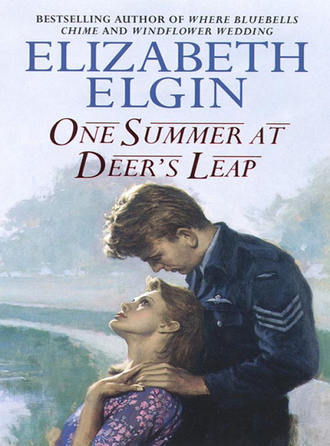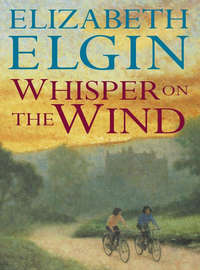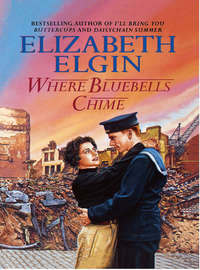
Полная версия
One Summer at Deer’s Leap
‘Hi, Mr Jarvis,’ I smiled. ‘What can I get you?’
He smiled briefly and held up his beer glass, then asked me what the ’eck I was drinking when I sat down beside him.
‘I’m on Coke tonight. I’m driving. I want to pick your brains,’ I went on without preamble. ‘Will you tell me what it was like around these parts in the war? Was it really dangerous, having that airfield so near?’
‘Us called it an aerodrome in them days. ’Twas only the Yanks that called ’em airfields. I wouldn’t say it was dangerous, exactly. But when you come to think of it, they were nobbut young bits of lads flying those bombers. It must have been a bother getting them into the air. Well, they’d be heavy, wouldn’t they, with bombs and fuel?’
He placed his empty pipe between his teeth and sucked on it, reflectively.
‘I suppose that was before they made the runways longer?’ I suggested, trying to steer the conversation round to the Smiths’ fields.
‘Before and after. Was still a bit hair-raising. ’em made the chimney pots rattle as they flew over. Noisy, it was.’
‘I suppose it was better when they came back from a raid – well, safer for Acton Carey people, I mean. At least their fuel would be almost used, and their bombs would have gone. Landing wouldn’t have been so risky, would it?’
I saw Jack Hunter’s hands gripping the controls.
‘You might think not, but getting back from the raid didn’t mean they were home and dry, oh my word, no! Some mornings I’d be biking to the workshop, early, and I’d see ’em, wheels down, circling. Mind, it was when they was circling with their wheels not down that the trouble started.’
‘I don’t understand …’ I sipped at my drink, and wished it was beer.
‘Well, sometimes ’em couldn’t get their undercarriages down! Sometimes they’d been got at by enemy fighters; shot up, see, and the wheels wouldn’t work. Had to do a belly landing then, and the fire trucks and the ambulances standing by. It wasn’t a picnic in the Army, fighting in Italy, but I always reckoned I had a better chance of seeing my demob than those flyers.’
‘So there were a lot of accidents?’
‘Oh, aye.’
‘Where was the aerodrome exactly?’
‘Was about two miles from the village, going in the direction of that house you’re staying at. Two miles might sound a long way, but it was only seconds in flying time. I was once walking a girl out as lived in a cottage about half a mile from Deer’s Leap, though it’s tumbled down since. The land rises a bit at the back of the farm and we could look down, summer nights, and see them taking off below us. In miniature, sort of.’
‘So if I went to the back of Deer’s Leap and looked down, whereabouts would the aerodrome have been?’
‘If you was to walk to the top of that paddock, then keep on for about a hundred yards, and look over to your left, you’d have seen it. Mind, there was a wood there once. Sniggery Wood, we called it, and very handy for courting couples. The Air Ministry folk cut down all the trees. They’d have been a hazard, see, for bombers taking off and landing. Things change, lass, and not always for the better.’
‘So maybe,’ I asked cautiously, ‘the people – the Smiths, didn’t you say? – who lived there would be able to watch it all?’
‘Happen they would, if they’d been interested, but I suppose they had better things to do with their time.’
‘And the daughter – Susan – do you suppose she might have known some of the airmen there?’ Some, I said, trying to make it sound casual.
‘Her might’ve. Mind, it wasn’t encouraged. Getting fond of them aircrew lads could lead to trouble. They used to have dances at the aerodrome – had a good dance band there, I believe. Civilian girls were welcome, but my sister were never allowed to go!’
‘Why could it lead to trouble?’ I found myself sticking up for Jack Hunter. ‘I thought girls were sort of chaperoned in those days.’
‘You did, eh?’ He chuckled, wheezily. ‘We aren’t talking about when Queen Victoria was on the throne! Young lasses took notice of what their parents said, I’ll grant you that, and they didn’t leave home, usually, till they was wed or called up. But he-ing and she-ing went on like it always had and always will.
‘What I was trying to say was that if a girl got fond of a flyer, then she could get real upset if he didn’t come back from a raid. And there was a better than even chance that he wouldn’t. Parents didn’t want their lasses to get tied up with them, for that reason – apart from the obvious, of course. They could’ve ended up in the family way, an’ all!’
‘I see. That would have been awful for them?’
‘Awful? It’d have been a disgrace; a scandal. When a lass got into trouble in those days, she had to take herself off quick afore it became obvious – if you know what I mean – if the young man responsible didn’t wed her. I did hear as how one father around these parts just chucked his lass on to the street and told her to be off with her shame. Her jumped in t’river!’
‘But women were called up into the Armed Forces as well as men. I suppose parents would be a bit worried, their daughters never having been away from home, sort of …’
‘Suppose they would be, but they weren’t given much of a choice! And not all of them lasses as went in the Forces were all that upset about it. For some, it was an adventure – and they got away from strict parents, an’ all!’ He began to fidget with his empty glass.
‘Can I fill you up?’
‘That’d be decent of you …’
‘Did the Smith girl get called up?’ I asked, the second I put the glass in front of him.
‘Don’t reckon so. Farmers kept their daughters at home on account they worked on the land. Farming was a reserved occupation, remember, for young men as well as for young women. Some folk thought it wasn’t fair when their daughters went off to war and farmers’ sons stopped at home safe.’
‘But they left Deer’s Leap, you said. Maybe she would have to do war work when they left the farm?’
‘Maybe she would. I was called up myself before the Air Force emptied them out, so I never knew what became of them. You seem very interested in t’Smiths.’
‘Not particularly,’ I shrugged, hoping I sounded convincing. ‘It was just that I wondered what it was like for the farmer who once lived at Deer’s Leap. I’m interested in all the people who lived there. I suppose it would have been quite some property when it was built.’
‘Still is, I suppose. The man as built it would be well heeled.’
‘Mm. He’d have had servants and farm workers. I think they would have slept in the rooms over the kitchen. If we could invent a time machine and dial the year we wanted, we’d know exactly how it had been.’
‘Won’t be long,’ he grumbled into his empty glass, ‘afore they do, the rate they’re going on at! Spending all that money shooting off to the moon and what did they find when they got there? Nowt but dust!’
‘Are you ready for another?’ His interest was flagging. Mention of a refill revived it noticeably.
‘Tell me about Italy?’ I asked, returning from the bar.
‘Which bit?’ Carefully he lifted a brimming glass to his lips.
‘Monte Cassino?’ I hazarded.
The half-moon of Saturday night was full now. It hung in the sky, large and round and glowing. Was it the harvest moon, or would that be the next one, at the end of the month?
Everything around me looked beautiful and mysterious and aloof. What was it about the moon that made people think of magic? Trees and hedges cast long shadows, and the road was clear and visible for as far ahead as I could see. Maybe it was on nights like this that witches flew. I wondered if the Pendle women had really been witches? Had a harvest moon looked down when they were hanged, one long-ago August? W. D. and M. D. would have known all about that trial in Lancaster. In 1612, when it happened, Deer’s Leap had already stood for twenty years. Mary Doe, as I thought of her, might even have visited Mistress Nutter and exchanged herbal remedies with her, because in those days the woman of the house was responsible for all the nursing and doctoring that was needed within her family. I wished like mad for that time machine. What would Mary Doe make of my bright red Mini that could rush along faster than witches on broomsticks? I threw back my head and laughed out loud just to think of it, and then my smile set on my lips and my laughter ended abruptly.
I could see him clearly in the moonlight, and instinct made me switch off my lights. I braked, and dropped a gear. I wouldn’t have expected him to be beside the clump of oak trees; further up the lane, really.
His outline stood out darkly, and there was no mistaking his extended arm, his jutting thumb. My mouth had gone dry and I ran my tongue round my lips. In the slipping of a second I asked myself if I were afraid and knew I wasn’t.
He took a step backwards as I stopped beside him. Please, please don’t vanish, Jack Hunter. I leaned over and pushed open the door.
‘I’m going to Deer’s Leap,’ I said. ‘Want a lift …?’
Chapter Five
My heart was thudding; the little pulse behind my nose had joined in too. I felt a choking excitement and, at the same time, an amazing calm. I willed him to get in.
‘Thanks a lot.’ He took off his cap and pushed it under the epaulette at his shoulder. Then he tossed his respirator on the floor of the car, and sat down. This time he could stretch his legs because I hadn’t moved the passenger seat forward. He banged the door shut and I began to wish for a flock of sheep again. Without them it would take less than three minutes to Deer’s Leap, and he would take off, I knew it, just as soon as he saw the kissing gate.
‘In a hurry, are you?’ I said, staring ahead.
‘Afraid so. I shouldn’t be here really. I’m on standby …’
‘What’s that?’ This time, I had the chance to ask.
‘It means we might be going tonight.’
‘Going?’ I prompted carefully, driving slowly.
‘On ops. We might go, and then again, we mightn’t. I shouldn’t be here. When we’re on standby, we can’t leave the aerodrome – or we shouldn’t.’
‘Security?’ I suggested, trying to be with it.
‘Yes. And there might be a call to first briefing.’
‘And if that happens, you won’t be there, will you? What’s first briefing?’
I was talking gibberish; talking for the sake of talking so he wouldn’t get out.
‘First briefing is just that. Pilots and navigators only; the rest of the crew join in later on.’
He was being very patient with me, and I was grateful for the fact that his mind seemed to be on other things. Not that I blamed him. To Berlin and back in inky blackness with searchlights trying to pick you out and night fighters ready to pounce would have been a bit distracting, to say the least.
‘I see.’ I didn’t really; didn’t understand the half of it – only what I’d read in books and seen in films. There had been a lot about his war on television four years back. ‘Are you billeted at Deer’s Leap?’
‘Oh, no. The farmer lives there still. There’s a chance that the RAF will take it, though it hasn’t happened yet.’
‘They seem to do pretty well as they like, don’t they?’
‘Yes, they do.’ He turned to look at me, frowning. ‘But there is a war on.’
My God! Indoctrinated by propaganda about the nobility of the cause! I’d read about it, but I hadn’t quite believed it. And I could tell him, I thought wildly, the exact day that Hitler would commit suicide, and about the two atom bombs the Americans would drop on Japan. I could, I thought, horrified, tell him the exact day he would die!
‘I hope you won’t go tonight; not with this moon …’
‘The moon’s good for fighters. They get above it, then fly out of it, and they’re on to you before you’ve got time to think. We call it a bomber’s moon because you could go without a navigator on nights like this. Everything’s there, below you, as clear as day. On the other hand, a Lanc makes a great silhouette against the moon. Given a choice, I wouldn’t go tonight.’
‘Do you know Susan Smith?’ I asked like a fool, straight out of the blue.
‘Of course I know her! That’s why I’m going to see her; tell her I might not be able to make it. I haven’t met her parents yet, so we decided it would have to be tonight …’
‘Only you’re on standby,’ I finished for him.
‘Yes, and I don’t want her to think I’ve stood her up. We always meet at the kissing gate, you see. She’ll be waiting …’
‘Are you both – I mean, is it steady between you?’ Oh, but I was pushing my luck!
‘If you mean are we in love then yes, we are. Very much …’
His voice trailed off again. He seemed never quite to finish a sentence.
‘And you’re going to meet Susan’s parents – ask them if you can get married?’ That’s what they once did, Mum said. Ask permission.
‘Yes. And I call her Suzie, by the way.’
I could see the white gate ahead and beside it, the black-painted kissing gate.
I was annoyed now that I had carefully closed the white gate when I’d left, thinking that if I drove straight up to the front door I might disorientate him; that if he didn’t see the iron gate he would stay in the car.
But I hadn’t even time to open the door when he said, ‘Thanks a lot! See you! G’night.’
I didn’t see him leave the car – not physically, I mean – and I didn’t see him open the kissing gate, but I saw it open of its own accord and I heard its creak as I’d known I would. He had just dematerialized tonight. If I hadn’t heard the gate then I wouldn’t have known where he’d gone.
I called, ‘’Night. See you sometime!’ but had no means of knowing if he’d heard me. Shaking now, I went through the motion of starting the car, driving through the gate, then closing it behind me. Only Hector’s frantic barking pulled me back to the here and now. I took a deep breath, then fumbled my key into the lock.
Tonight – all of it – was going to take a bit of working out. I thought about the mental jigsaw puzzle and knew I had begun to fill in the outline, though there was a long way to go before I completed it – if ever I did.
Hector greeted me joyfully. I patted his head and he felt real and solid and of this age. Carefully, because I was trying to get a hold on myself, I bolted the front door, top and bottom, then double-locked it.
Only then did I say, ‘’Strewth, Hector, you’d never believe the half of what’s just happened!’
Next morning, I awoke to gloom and the sound of rain pattering against the window.
How dare it rain at Deer’s Leap! I got out of bed and closed the window. Heavy rain on wheat and barley and oats ripe and ready for harvesting for the war effort, Mr Smith could do well without!
Dammit! I was back to that war again! I was here to write and look after a house, not to dig back half a century because a ghost couldn’t find his girlfriend. We were coming up to the Millennium, and Susan Smith and Jack Hunter were history!
But they weren’t, the voice of reason whispered firmly. Jack Hunter didn’t know he had died more than fifty years ago and as far as I knew, Susan could still be alive. I not only wanted to establish that fact, but deep down I was certain that the niggling inside me would go on until I had found her!
But how do you find an elderly lady – who could perhaps be married and have children – grandchildren – and who maybe didn’t want to be found? And just supposing the impossible happened and one day she opened her front door to me, what would I say?
‘Hullo! You don’t know me, but not so long ago I met a ghost who was once in love with you! Over fifty years ago, mind, but I think you should know he still needs to find you. His name is Jack Hunter.’ And the poor old thing would look at me vacantly and say, ‘Jack who?’
I tied my dressing gown tightly around me, glad of the warmth, and switched on the kettle. Then I fed the animals, after which Lotus walked ahead of me, tail erect, indicating at the conservatory door that she wished to spend the morning in there. She was quite intelligent I had to admit, and lost no time showing me where she was in the habit of sleeping on wet mornings.
The view from the kitchen window was a forlorn one. Plants dripped miserably and a mist covered everything, blocking out the view – even the white-painted gate. I decided to bring in logs and light the kitchen fire, then realized that not even that would inspire me to words, for this was not a morning for creativity. I didn’t have word block. There really is no such thing. As far as I am concerned, when the words won’t come it is because I simply don’t want to write!
Having established that, my conscience refused to let me sit idly over a fire, curled up with a book. I would drive to Clitheroe instead. I needed to visit the library to check on something I wasn’t at all sure about; I would find it there, in Encyclopaedia Britannica, I was certain, but just in case I needed to borrow any books for research while I was staying at Deer’s Leap, Beth had left me her library ticket. Decent of her, really. And I must buy a couple of trout to replace those we had eaten for Sunday lunch. Raiding Beth’s freezer was not on! Maybe, too, I would buy sausages and bacon and have a comforting fry-up tonight – sitting at the kitchen table beside a comforting fire. After all, a writer needs some time to herself, though my professional conscience would insist I get down to work this afternoon when I got back.
I found a car park in Clitheroe with no trouble. Immediately inside the library, I told myself that once I had established that Dorcas in Firedance, as I was beginning to know the book, could have used a phonecard in 1985, I would leave at once. Indeed, I discovered that phonecards were in use as long ago as 1981, and would have cost two pounds for forty units. I was glad I had checked. You have to be so careful. Errors are jumped on at once!
Even though I had already made up my mind not to browse along the shelves, I began to look at the section headed ‘World Wars One and Two’. I walked slowly, willing myself not to pick up a book; not even for one quick glance.
Books with tanks, aircraft and submarines on their jackets tempted me, but I walked on. Not until novel number three, which I was almost sure now would be set in that period, would I start dipping into Jack Hunter’s war. Yet even as I walked away something hit my consciousness and said, ‘Look again!’ So I obeyed the tingling at the back of my nose, and did exactly that.
Bomber Command. The title stood out clearly. RAF Bases in Lancashire 1939–1945. As I picked it off the shelf, I knew that RAF Acton Carey would be listed there, even though hardly a trace of it existed now.
I made for the desk, determined not so much as to glance at it until tonight when I had had my supper and my time was my own. Supper! I bought sausages from a shop near the castle ruins, then crossed the road to buy rainbow trout. As I walked to my car, I realized the rain had stopped and that a sliver of blue sky had appeared somewhere in the direction, I calculated, of Beacon Fell. I might have known, I smiled, that rain so heavy, so early, couldn’t last.
I resisted the urge to buy a coffee, knowing that if I did I would open the book. Thoughts of that war would invade my mind, and I had already spent too much time thinking about the airman. And I had Suzie to worry about now; Susan Smith who might well be there for the finding! Oh, please, she would be?
I existed on a sandwich and far too many cups of coffee until nearly five o’clock. The garden looked green, the scent of wetness wafting in through the open window. The earth was dark again, having guzzled its fill, and all was well with my world.
I gathered up my papers, turned off the machine, then stretched long and lazily. The flow had returned, the lost morning atoned for. I felt almost smug as I let Hector into the yard.
First I would feed the animals and cook my supper. Then I would allow myself the luxury of a log fire and curl up with the book, hoping it would tell me something, however small, about how it had once been, at RAF Acton Carey.
I pricked sausages and rinded bacon. I would make fried bread too, I thought defiantly. I felt so pleased with my progress, one way or another, that I knew I would finish the bag of toffees as well, once I was relaxed in the firelight. I felt so good that I fixed the telephone on the dresser with my eyes, willing it not to dare ringing.
I should have let well alone. Five minutes later it rang.
‘Yes?’ I hoped I didn’t sound too cross.
‘Hi, love! It’s Jeannie. Thought I’d ring you before I left the office. I am expected, tomorrow?’
‘You are, but this last week has flown! Same train, is it? Will I meet you at Preston …?’
‘I’m so looking forward to it. Don’t bother making a meal. I’ll eat on the train. How’s the book coming along?’
‘Fine. It poured down, this morning, so I went to the library.’
‘Rain?’ She sounded put out.
‘Yes, but it’s cleared up now. We’ll have another good weekend. Anyway,’ said the market gardener’s daughter in me, ‘we needed a good shower.’
‘Anything I can bring, Cassie?’
‘Just yourself. See you tomorrow night.’
The fire flickered and snapped. Hector lay sleeping at my feet; Tommy, mesmerized by the fire, blinked and stretched and yawned. By my side was what remained of the bag of toffees; on the arm of the sagging old chair lay the book I had been longing to open since it shouted ‘Pick me up!’ from the library shelf.
First, I fanned the pages, stopping here and there to look at what had once been amateur snaps of crews and aircraft, and diagrams and plans of airfields – aerodromes, the compiler of the book called them.
By far the most important parts, as I saw it, were the runways and the control towers. The perimeter tracks – which ran right round each airfield – and various blocks of buildings were further away and lower in the order of things, it would seem. I turned to the index. What I sought was there, on page ten.
RAF STATION ACTON CAREY. Completed Oct. 1943. Aircraft consisted two squadrons of Lancaster bombers, Marks I & II.
There followed a history of all the raids from Acton Carey; which shipyard or factory or docks had been targeted and how many bombers were missing after each one. The operations flown from Acton Carey had been many. Each Lancaster carried a crew of seven, and seven young lives became statistics with each bomber that did not return.
I remembered the memorial outside the church, the grateful remembrance and the date. Then I scanned the list of sorties.
On 2 June 1944 a flying bomb site in France had been targeted, and on 3 June another site at Mont Orgueil. Then, right up until 6 June, marshalling yards in France had been raided every night.
And then it was there – 8 June 1944. Flying bomb site at St-Martin-Le-Mortier; a daylight raid on which four Lancasters were lost; one of them piloted by Sergeant J. J. Hunter.
I tried to remember what I knew about flying bombs; bombs with wings, hadn’t they been, and launched from France against the south coast and London? Hitler’s secret weapon; one which would wipe out the D-Day landings and bring Britain to its knees.
And Jack Hunter had dropped his bomb load on one of the launching sites, because until they were destroyed they were a very grave danger to this country. My history lessons in the sixth form had told me that, yet now I was looking at a list no longer impersonal, and I knew when and from where our bombers took off on so urgent a mission; knew too the name of one of the men who did not return from it.
Jack Hunter. Twenty-four years old and in love with Susan Smith from Deer’s Leap farm, who met him secretly at the creaking kissing gate. Did he ever get to meet her parents, I wondered, or were Jack and Susan never to see each other again?








